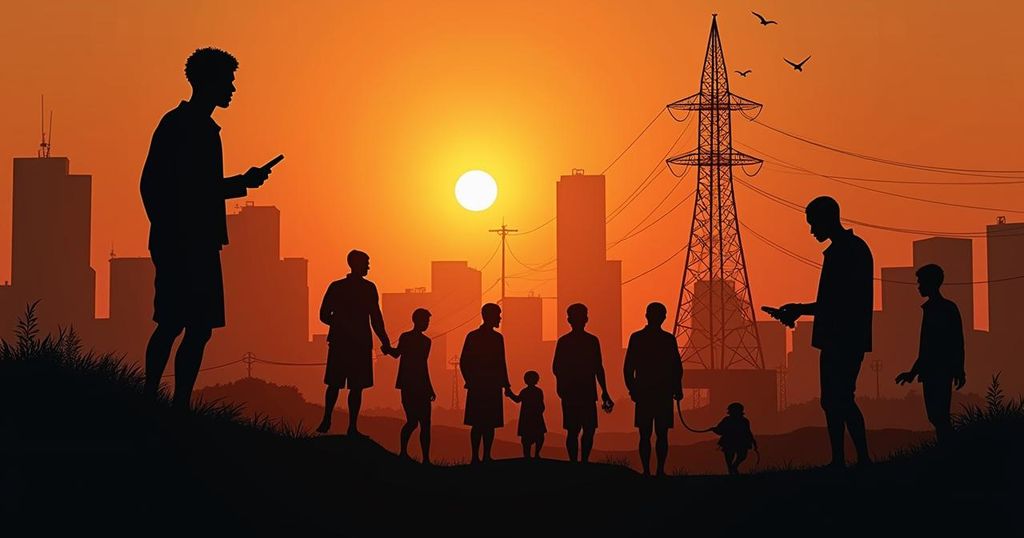The article examines the emotional and logistical challenges faced by the Lebanese diaspora in West Africa amidst the escalating conflict in Lebanon. Three individuals share their experiences of fear, anger, and solidarity as they work to support their families back home and navigate the chaos of war from afar.
The ongoing military escalation in Lebanon has instilled a profound sense of fear and sorrow within the Lebanese diaspora residing in West Africa, particularly in nations such as Senegal, Côte d’Ivoire, and Nigeria. In a poignant reflection of their anguish, members of this community recount their experiences and responses to the violence and uncertainty engulfing their homeland. In Dakar, Zoheir Zeidan, a telecom company director and Shiite Muslim, articulated his apprehension long before the Israeli air strikes commenced, having anticipated that Israel’s military focus would shift to Lebanon following the outbreak of hostilities in Gaza. “On the first day of Israel’s attack, a close childhood friend of mine, who I grew up with here, had a bomb dropped on his house,” he revealed. He shared the devastating news that many of his childhood acquaintances had perished in the conflict, solidifying a pervasive atmosphere of despair within the Lebanese community abroad. Zeidan emphasized the urgency of mobilizing support for those affected in Lebanon, as material aid is systematically organized from West African cities back to family members facing dire circumstances. In Côte d’Ivoire, Zara Mirza-Branger, a sales assistant with Lebanese roots, expressed her distress over the bombing that has enveloped her parents’ hometown of Tyre. Despite efforts to connect with her parents and provide financial assistance, she lamented the uncertainty of their future, stating, “If all this stops, if they go back south and don’t find a house, then we really won’t know what to do.” Mirza-Branger has joined local efforts to gather humanitarian aid, indicating that discussions within her Lebanese community revolve solely around the ongoing conflict. From Lagos, George Chaanine, a businessman from the Maronite Christian community, conveyed his concerns regarding the broader geographic impact of the hostilities, noting, “Because this time around… the war is almost in different parts of Lebanon and not just in certain areas.” Amid logistical challenges stemming from the conflict, he recounted how community members rally through digital platforms to facilitate aid contributions. The collective sentiment among these individuals highlights the anguish and solidarity experienced by the Lebanese diaspora in West Africa as they navigate the psychological and humanitarian ramifications of the war in Lebanon.
The Lebanese community in West Africa is significantly impacted by the ongoing conflict in Lebanon, particularly with Israeli air strikes that have escalated violence in the region. The diaspora, comprising several hundred thousand individuals, is increasingly concerned for their families back home while facing the challenges of providing support from afar. Their experiences reflect an emotional struggle against fear, anger, and helplessness as they witness the devastation unfold, which has reverberated across their communities in Senegal, Côte d’Ivoire, and Nigeria. More than just personal loss, the crisis has ignited conversations surrounding aid, solidarity, and the implications of loss of home. With limited resources and logistical difficulties, the diaspora works collectively to provide assistance to their loved ones amidst an overwhelming atmosphere of uncertainty.
The testimonies of Zoheir Zeidan, Zara Mirza-Branger, and George Chaanine encapsulate the emotional turmoil faced by the Lebanese diaspora in West Africa as they grapple with the implications of the ongoing conflict in Lebanon. Their narratives reveal a profound sense of solidarity while illustrating the acute challenges of providing aid and maintaining connections in times of distress. As the violence continues, the need for humanitarian support and the psychological impact on those living far from their homeland remain pressing concerns. Their stories serve as a poignant reminder of the far-reaching effects of war beyond its immediate geographic confines.
Original Source: www.channelstv.com






